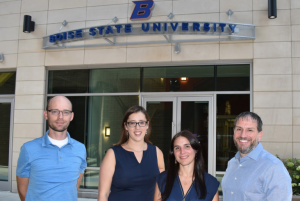
A Boise State University research team recently was awarded nearly $1.2 million from the National Science Foundation to develop an internet search user interface tailored to the skills and needs of children ranging from 6-11 years old. Over the four-year grant period, researchers Jerry Fails, Casey Kennington, Sole Pera and Katherine Landau Wright will use an interactive and adaptive approach to better engage and enable children to find resources on the internet that match their search intent.
“Children face many challenges when searching online that go beyond just ‘safe-search’ and keeping them away from adult content. We view children as emergent searchers who face challenges spelling and forming an appropriate query, analyzing search results and selecting the best option. No current search engine adapts to children’s specific needs,“ said Fails, principal investigator of the project. “CAST will not only adapt and help them find useful results, but it will also provide scaffolding for emergent searchers so they learn to search as they search and are able to find and use appropriate internet resources.”
The Boise State research team includes faculty from the Department of Computer Science, and the Department of Literacy, Language and Culture to bring together expertise in human-computer interaction, information retrieval, natural language processing and education. The project team will advance research to facilitate the creation of good queries, address spelling errors, tailor to children’s specific cognitive knowledge and learning needs and help children better understand their search results. The team will partner with local schools to assess and address the unique search challenges children experience.
The importance of working as an interdisciplinary team that includes expertise from various areas of computer science and education is key to this research. This work has the potential to help generations of emergent searchers by enabling them to locate information online and develop life skills that are crucial in our information-rich world.
Learn more about the award on the NSF website.